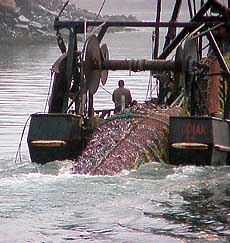|
A senior member of the United States delegation, briefing reporters on background Tuesday said there is a U.S. initiative underway to restore and protect the oceans, dealing with such issues as coral reefs, fish stocks, land based pollution and watershed management.
"We will do our initiatives with partners - partners that have already signed up with us. And that's only the beginning of the process," said the official who did not want to be identified by name. "This is a journey - whether it's hunger or restoring depleted ocean resources - this is a journey. But it's got to start here in Johannesburg. So that's our expectation."
Oceana cited figures that show 25 percent of the world's fish catch - 44 billion pounds of fish and
thousands of ocean animals - are unintentionally caught and discarded, dead and dying, each year.
Such wasted catch and other destructive
fishing practices are a large part of the reason
why more than 70 percent of marine fish
species worldwide need urgent action to prevent
population declines, the group said.
Pollution from ships, including oil, toxic
chemicals, garbage, and sewage, is a major
threat to ocean wildlife. Toxic air pollution that
falls into the oceans also seriously harms sea
life, said Oceana, which merged in May with
the American Oceans Campaign to build an
international movement to save the oceans
through public policy advocacy, science,
economics, legal action, grassroots mobilization,
and public education.
|


